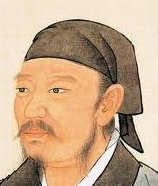
|
Go to China main page
File last modified: | Go to Human Nature, Military Affairs |

XÚN Qīng 荀卿 (or XÚN Kuàng 荀况) (298?-238) was a prominent Confucian who probably lived about 250 years after Confucius (Kǒngzǐ 孔子), and would have been learning about Confucianism when Mencius (Mèngzǐ 孟子) had already died, or, if other dates are accepted, when Mencius was at least already a middle-aged man. Like Confucius and Mencius, Xún Qīng is known today with the honorary suffix zǐ at the end of his name: Xúnzǐ 荀子, “Master Xún.”

Xúnzǐ shared with Confucius and Mencius the core of the Confucian ideals of what human behavior ought to be like, and what life in a perfect world would be like (and, like them, he seems to have believed that it had been perfect in the remote past).
It is a critical point of Confucian thinking that for a state to be successful, the ruler must be conspicuously moral because the population, inclined by nature to be moral, will follow his example, and peaceful and industrious outsiders will migrate to the his realm, drawn by the force of its widespread contentment.
But are people inclined by nature to be moral? If they are, they need little more by way of government than simply to be left alone as long as they are inspired by the awesome righteousness of their king. Although Confucius did not proceed to this stark a simplification, the case was pushed a century later by his follower Mencius.
But if people are not naturally good, then the state must provide the moral guidance to produce at least a minimum of civic responsibility so that they do not kill each other. That is essentially Xúnzǐ’s view.
Xúnzǐ argues that humans are probably perfectible, with cultivation of the kind that Confucius so enthusiastically endorsed, but they are by no means the excellent raw material that Mencius seemed to envision. And although the force of a leader’s moral example is strong —that is a core insight of all Confucianism— it would be unrealistic to assume that with a moral leader (or more exactly moral leadership) all need for laws will simply fade away, however much we might wish that were so.
Among Xúnzǐ’s followers there were two students —Hán Fēi 韩非 and Lǐ Sī 李斯— who were destined to give up on Confucianism altogether and to become leading figures of the totalitarian “Legalist” school. This forever besmirched Xúnzǐ’s reputation as a great Confucian thinker.
For more about the philosophers discussed here, click here.
Presented here are two selections from writings associated with Xúnzǐ. The first is a single page summarizing his dispute with Mencius (Human Nature Is Evil). The second is a longer passage (here divided into arbitrary chapters) discussing warfare (Debate on Military Affairs), which also includes Xúnzǐ’s upstart student LǏ Sī 李斯.
Three interactive review quizzes are available for this material: